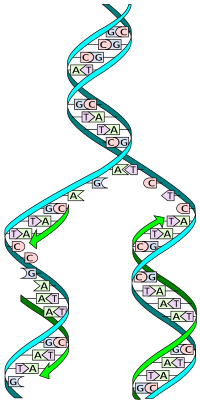
Photo from wikipedia
Telomeres are nucleoprotein structures that cap the ends of linear chromosomes. Telomeric DNA comprises terminal tracts of G-rich tandem repeats, which are inherently difficult for the replication machinery to navigate.… Click to show full abstract
Telomeres are nucleoprotein structures that cap the ends of linear chromosomes. Telomeric DNA comprises terminal tracts of G-rich tandem repeats, which are inherently difficult for the replication machinery to navigate. Structural aberrations that promote activation of the alternative lengthening of telomeres (ALT) pathway of telomere maintenance exacerbate replication stress at ALT telomeres, driving fork stalling and fork collapse. This form of telomeric DNA damage perpetuates recombination-mediated repair pathways and break-induced telomere synthesis. The relationship between replication stress and DNA repair is tightly coordinated for the purpose of regulating telomere length in ALT cells, but has been shown to be experimentally manipulatable. This raises the intriguing possibility that induction of replication stress can be used as a means to cause toxic levels of DNA damage at ALT telomeres, thereby selectively disrupting the viability of ALT cancers.
Journal Title: Open Biology
Year Published: 2022
Link to full text (if available)
Share on Social Media: Sign Up to like & get
recommendations!